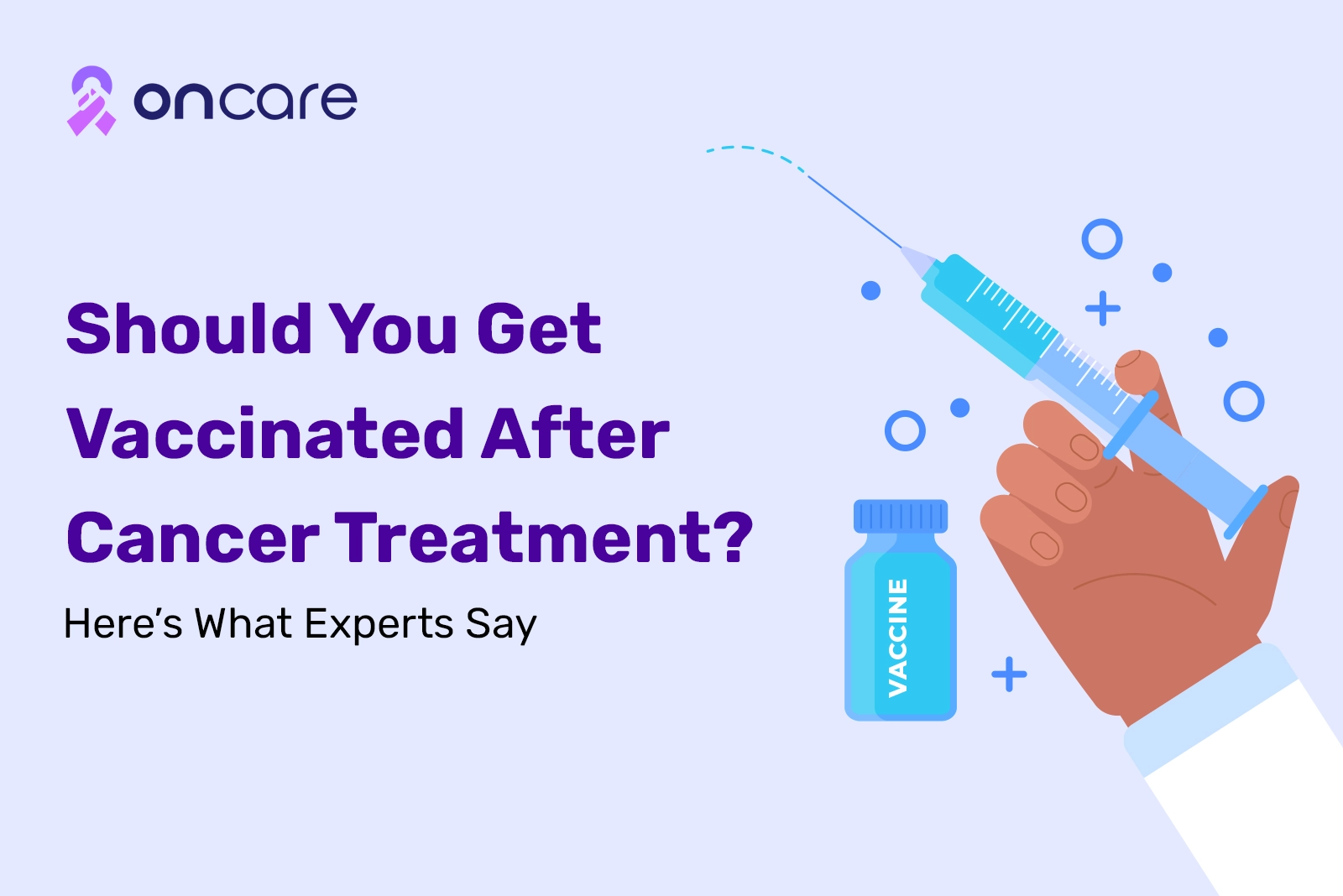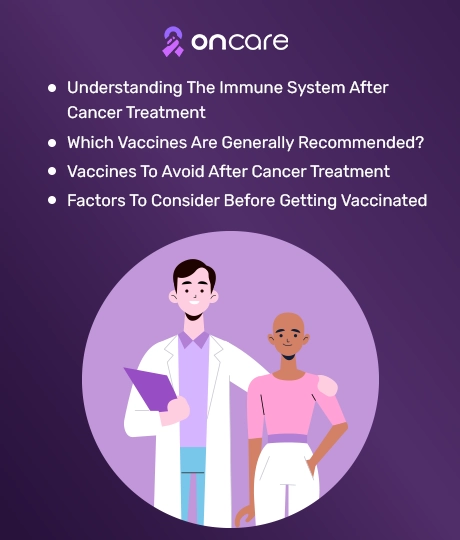Should You Get Vaccinated After Cancer Treatment? Here's What Experts Say

Cancer survivors face a unique set of challenges even after their treatment ends. Survivors often deal with a weakened immune system, which makes them susceptible to infections. Vaccination is an effective way to safeguard health and reduce the risk of preventable diseases, but for those who have undergone cervical cancer treatment, this process is not always straightforward.
Factors such as the type of cancer treatment for cervical cancer received and the survivor’s current health status can influence the safety and efficacy of vaccines. In case you’re wondering where to take HPV vaccine and other types of vaccines after your cancer treatment, Oncare is the ideal destination. With a team of experienced oncologists, they’ll guide you effectively on which vaccines would be right for you to take after the treatment.
Understanding The Immune System After Cancer Treatment
Let us begin by understanding the immune system after cervical cancer treatment:
The Impact of Cancer and Its Treatments on Immunity
The immune system is a complex network designed to protect the body from harmful invaders like bacteria, viruses, and fungi. Cervical cancer treatments, including chemotherapy, radiation, and immunotherapy, can weaken this system in several ways:
- Chemotherapy: By targeting rapidly dividing cells, chemotherapy often damages healthy cells, including white blood cells crucial for immunity.
- Radiation Therapy: Localized cervical cancer treatments can weaken the immune system indirectly, especially when targeting areas like the chest, which houses the thymus—a critical organ for immune function.
- Surgery: Major surgeries can cause temporary suppression of the immune system due to the body’s focus on healing.
- Immunotherapy: While designed to enhance the immune response against cancer, immunotherapy can sometimes dysregulate the immune system, leading to autoimmune-like reactions.
Long-Term Effects on Immunity
Even after completing cervical cancer treatment, survivors may experience lingering immune suppression, particularly if they received aggressive therapies or underwent bone marrow transplantation. Recovery after cancer treatment for cervical cancer can take months or years, depending on individual factors like age, overall health, and the type of treatment. We, at Oncare, ensure each step of your recovery from the cancer treatment is smoother so that your mental burdens are lesser.

Which Vaccines Are Generally Recommended?
Vaccination plays a crucial role in post-cancer recovery, protecting against infections that could otherwise lead to severe complications. However, the type of vaccines administered, like the COVID or cervical cancer vaccine, must be carefully considered.
Common Vaccines For Cancer Survivors
Several vaccines, like influenza and HPV vaccines, are commonly recommended for cancer survivors due to their efficacy in preventing potentially dangerous infections. Here’s a complete list of vaccines our oncologists recommend for cancer survivors:
Influenza Vaccine
It is an annual flu shot that protects against seasonal influenza, which can cause severe complications in immunocompromised individuals.
HPV Cervical Vaccine
The HPV vaccine (e.g., Gardasil 9) is non-live and contains no infectious virus, administrated into the muscle of the upper arm, making it safe for immunocompromised individuals, including cervical cancer disease survivors, once their immune system is stable. If you are wondering what age you get the HPV vaccine, you can get it from as early as 12 years of age.
Pneumococcal Vaccine
It reduces the risk of pneumonia, meningitis, and bloodstream infections after cancer treatment for cervical cancer, which can be life-threatening for those with weakened immune systems.
Hepatitis B Vaccine
This vaccine is recommended for those at risk of hepatitis B infection, especially survivors requiring blood transfusions during their cervical cancer treatment.
COVID-19 Vaccine
It is vital for reducing the severity of COVID-19, particularly for individuals with ongoing immune suppression.
Tdap Vaccine
It protects against tetanus, diphtheria, and pertussis. Booster shots may be necessary if a survivor’s vaccination history is incomplete.
Importance of Vaccines for Preventable Diseases
For head cancer, cervical cancer disease, or any other types of cancer survivors, illnesses that are mild or manageable for others tend to escalate quickly. Here are some ailments that often pose risks to cancer survivors:
- Flu: It is a common virus that can lead to pneumonia or hospitalization in those with compromised immunity.
- Pneumonia: A preventable disease, pneumonia can exacerbate respiratory issues, making recovery even harder for cancer survivors.
Shingles: It is particularly dangerous for older adults and those who have undergone immune-modulating cervical cancer treatments.
Vaccines To Avoid After Cancer Treatment
Certain vaccines can pose risks to cancer survivors, particularly those with lingering immune suppression.
Why Avoid Live Vaccines?
Live vaccines contain weakened versions of the virus or bacteria they aim to protect against. While generally safe for healthy individuals, these vaccines can cause the diseases they prevent in people after their cancer treatment for cervical cancer. Examples include:
- Measles, Mumps, and Rubella (MMR) Vaccine.
- Yellow Fever Vaccine.
- Live Shingles Vaccine.
Safe Alternatives
For most live vaccines, safer inactivated or recombinant versions are available. For instance, our oncologists recommend the recombinant shingles vaccine (RZV) over the live shingles vaccine for cancer survivors.
Factors To Consider Before Getting Vaccinated
Decisions about getting common vaccinations like the COVID or HPV vaccine must be personalized, considering the survivor’s medical history, current health, and cervical cancer treatment specifics.
Type of Cancer and Treatment Received
Let us see some types of cancer and how they affect vaccination post-treatment:
- Hematological Cancers (e.g., Leukemia, Lymphoma): Survivors often experience prolonged immune suppression and require specialized vaccination schedules.
- Solid Tumors (e.g., Breast, Lung, Prostate): These individuals typically recover immune function more quickly, allowing earlier vaccination.
- Bone Marrow Transplants: Patients often restart their vaccination schedule to build immunity from scratch.
Current Health Status and Recovery Level
Factors like age, nutritional status, and the absence of infections influence a survivor’s readiness for vaccination (pneumococcal, Hepatitis B, HPV vaccine, etc.). Immune function is often assessed through blood tests before proceeding.
Consultations With Oncologists
Oncologists and immunologists are vital in guiding vaccination decisions. Oncare has the best oncologists on board to help you navigate life as a cancer survivor. They offer in-depth insights into:
- Which vaccines are most appropriate, be it a Hepatitis B or HPV vaccine
- The safest timing based on recovery
- Potential interactions with ongoing medications or therapies
Tips For Safely Getting Vaccinated After Cancer Treatment
To ensure vaccinations are both safe and effective, cancer survivors should follow these tips:
Preparing For Vaccination
Here’s how you can prepare for the vaccination:
- Share detailed medical records, including treatment history, with the administering oncologist.
- Ensure overall health is optimized through proper nutrition, hydration, and rest.
- Schedule your vaccinations like the COVID or cervical cancer vaccine during a period of stable health, avoiding times of acute illness.
Monitoring Side Effects
While vaccines are generally safe, including the COVID, influenza, and HPV vaccines, minor side effects can occasionally occur. These might include:
- Pain or swelling at the injection site.
- Low-grade fever or fatigue.
- In rare cases, severe allergic reactions require immediate medical attention.
- Survivors should monitor for prolonged or unusual symptoms and report them to their healthcare provider.
We at Oncare ensure you are under the strict supervision of our doctors or your caregiver so that no side effect is ignored and after-treatment care is customized accordingly for your quick recovery.
Keeping Track of Vaccinations
Maintaining an updated vaccination record for your previous COVID and cervical cancer vaccine is essential for:
- Scheduling timely booster shots.
- Preventing duplicate vaccinations.
- Providing accurate information to healthcare providers.
Why Is Vaccination Needed For Cancer Survivors?
Are you wondering why vaccination is needed by cancer survivors? Well, below, we’ve mentioned some of the key reasons behind getting vaccinated post-cancer treatment.
Protecting Against Preventable Diseases
Vaccines like the Hepatitis B, pneumococcal, and HPV cervical vaccines offer enhanced protection against diseases that can have serious consequences for immunocompromised individuals.
- Hepatitis B: Vaccines prevent liver infections that could exacerbate complications in survivors with organ damage.
- Pneumococcal Disease: Vaccination also reduces the risk of severe respiratory infections.
Supporting Long-Term Recovery
By minimizing the risk of preventable infections, vaccines enable survivors to focus on regaining their strength and improving their quality of life.
Contributing to Herd Immunity
Cancer survivors play a role in public health by getting vaccinated, indirectly protecting others who cannot be vaccinated due to health conditions.
Expanding On the Psychological and Social Aspects
The decision to vaccinate is not solely medical—it also carries psychological and social implications for cancer survivors.
- Regaining Confidence: Knowing they are protected against preventable illnesses allows survivors to re-engage with social activities without excessive fear of infections.
- Reducing Anxiety: Clear guidance and successful vaccination experiences can alleviate health-related anxieties often faced by survivors.
Social Responsibility: Vaccination demonstrates a commitment to safeguarding both personal and community health.
Conclusion
Vaccination is an essential component of recovery for cancer survivors, but it requires careful consideration and expert guidance. By understanding the unique challenges posed by weakened immunity and selecting the right vaccines, like the COVID and cervical cancer vaccine at the right time, survivors can significantly reduce their risk of infections and focus on rebuilding their lives.
For cancer survivors, vaccination is not just about preventing diseases—it is a proactive step toward embracing a healthier, more resilient future. By consulting our expert oncologists at Oncare, you take a step closer to holistic cancer treatment and post-treatment vaccinations that improve and maintain your overall good health.
Frequently Asked Questions (FAQs)
Cervical cancer can be serious, especially if diagnosed in later stages when it may spread to other organs. Early-stage cervical cancer is highly treatable and has a good prognosis.
Yes, many individuals live 10 years or more after cervical cancer, particularly if it is diagnosed early. Survival rates depend on the stage of cancer and the success of cervical cancer treatment. Early-stage cervical cancer has a 5-year survival rate of about 92%. With proper care, long-term survival is achievable.
After cervical cancer, patients undergo regular follow-ups to monitor for recurrence and manage side effects. Emotional and physical recovery may take time, and support from healthcare providers is crucial.
In the final stages (Stage IV), cervical cancer spreads to distant organs like the lungs or liver. Symptoms may include severe pain, fatigue, and difficulty urinating or breathing. Treatment focuses on palliative care to manage symptoms and improve quality of life.
Yes, cervical cancer can lead to death if left untreated or diagnosed at an advanced stage. It can cause organ failure or severe infections as it progresses. Early detection and treatment significantly lower the risk of fatal outcomes.
Cervical cancer can be cured if detected and treated early, often through surgery or radiation. Advanced stages may require ongoing treatments to manage the disease rather than completely cure it.
Having children after cervical cancer is possible, especially with fertility-sparing procedures like trachelectomy. Advanced treatments, such as radiation or hysterectomy, may affect fertility. Consultation with specialists helps explore options like surrogacy or adoption.
Yes, the cervix can be removed through a trachelectomy for early-stage cervical cancer or a hysterectomy for more advanced cases. These surgeries aim to eliminate cancer and may preserve fertility in some cases.
The best treatment depends on the stage, ranging from surgery for early cases to radiation and chemotherapy for advanced ones. Targeted therapies and immunotherapies are options for some patients.